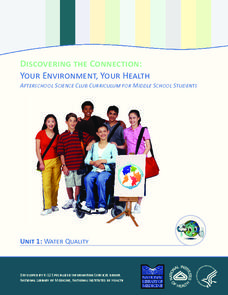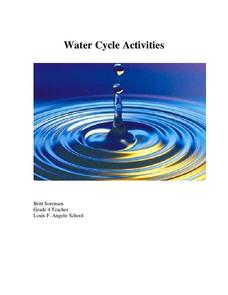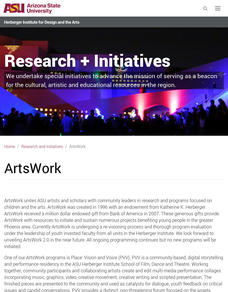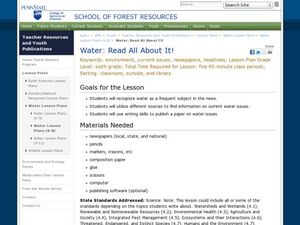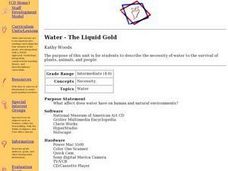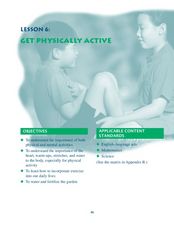Smithsonian Institution
Water/Ways: The Poetry of Science
Water is the source of life. It appears in poetry in both peaceful and torrential descriptions; it appears in earth science in its liquid, gaseous, and solid states. Combine these interpretations of our planet's most precious and...
National Library of Medicine
Your Environment, Your Health: Water Quality
How important is water quality where you live? The first module in a six-unit series includes four lessons on water quality. By applying the concept directly to the lives of pupils, they engage in meaningful learning. They read about...
Curated OER
Water: From Neglect to Respect
The goal of this collection of lessons is to make middle schoolers more aware of the ways in which they are dependent upon water to maintain their standard of living. Learners compare water use in Lesotho to water use in the United...
Curated OER
Water Cycle Activities
Explore the water cycle in all aspects with a resource packed full of activities and lessons. The 37-page packet comes with vocabulary, a game, writing prompts, printables, and opportunities to journey through the stages in the water...
Pace University
Water Cycle
Rain, rain, go away—wait, there it is again! Elementary scientists learn how rain works its way through the stages of the water cycle with a series of classroom lessons and hands-on activities.
Curated OER
Water
Third graders study different bodies of water and how they fit into the water cycle. They explain that materials exist in different states (solid, liquid and gas) and change from one to another, that there are systems, order, and...
Curated OER
Observe Earth Day with Art Projects Made from Recycled Materials
Creative hands-on art project ideas that are easy on the earth and easy on a teacher’s budget.
San Francisco Public Utilities Commission
Recycled Water: A Smart Way to Reuse Water
Learn about wastewater and recycled water with a science reading activity. After learners finish a two-page passage about conserving the water supply, they answer six comprehension questions about what they have read.
Curated OER
Water: Read All About It!
Students discuss newspapers and water and work in groups to develop their own paper focusing on water issues. In this journalism lesson, students discuss the value of newspapers and water as an issue. They work as a group to develop a...
Channel Islands Film
Dark Water: Lesson Plan 2 - Grade 3
A discussion of bioluminescence launches an investigation of animal adaptations. After re-watching the opening minutes of Dark Water, class members listen to a reading of What Do You Do with a Tail Like This, and then create a new...
Curated OER
The Water Cycle
Students simulate the water cycle. In this water cycle lesson, students create a model of the water cycle. Students draw the water cycle and write a paragraph explaining their drawing.
Curated OER
Water-The Liquid Gold
Students investigate the necessity of water for the survival of plants, animals, and people. They explore the affect that water has on human and natural environments through literature, field trips, and discussions.
Curated OER
Water Works
Students investigate water use and what happens at a water treatment plant. They define and discuss key vocabulary terms, view a diagram of a water treatment plant, and conduct an experiment that simulates the water filtration process.
Curated OER
Water Works
Students create a "water web" to illustrate the interdependence among water users and producers. They distinguish between direct and indirect uses of water; illustrate the interconnectedness of water users in a community; and demonstrate...
Curated OER
The Water Cycle
Students conduct experiments involving different parts of the water cycle. In this water cycle lesson plan, students conduct five simple experiments to demonstrate how the water cycle works. The results of each experiment is discussed as...
Curated OER
The Water Cycle: Revising the Drafts
Young scholars explore states of matter by concentrating on the ways in which water moves between its solid, liquid, and gaseous states in a variety of Earth environments familiar to the students. Young scholars represent these movements...
Curated OER
Mixed Media Ocean Art
Students design pictures of ocean environments. In this art lesson plan, students use mixed media art materials to develop a picture that depicts the ocean environment. They use paint, sand paper and various basic art materials.
Curated OER
Science and Art Museum
Imagine each one of your learners on task and interested in scientific material. Learners investigate science related art by creating a small museum! Using digital cameras, pupils photograph different scientific actions that look...
Curated OER
Lesson 2 Its a Small World (Day 2)
Learners are able to explain how the water cycle recycles the earth's water supply. They are able to make use of the knowledge of land forms learned in social studies. Students are able to form a hypothesis on how/why the water cycle...
Curated OER
Get Physically Active
Learners discover the importance of water. In this physical education science lesson, students consider mental and physical activities. Learners find their pulse and measure their heart rate. Students discuss the importance...
Curated OER
Drip and Drop's Adventure
Students determine ways of conserving water and write a Big Book about them. In this water conservation lesson, students participate in a puppet show about Drip and Drop, and ways to conserve water. They write a book that tells about...
Curated OER
Water, Glorious Water
Young scholars identify the various uses of water. In this water conservation lesson, students read the book, The Drop In My Drink: The Story of Water On Our Planet and write down their favorite uses of water. Young scholars illustrate...
Curated OER
Water, Water, Everywhere and Always on the Move
Learners create their own water cycle in a terrarium. In this water cycle lesson, students research the water cycle and complete a worksheet using the Internet. They create a water cycle of their own in a jar with stones, sand, soil, and...
California Academy of Science
Fresh Solutions: Design Thinking Challenge
How do people transport fresh water long distances to ensure everyone has access to it? The final lesson in the 10-part Fresh Solutions unit encourages individuals to design their own solution, or solutions, to that very problem. Groups...

